How can the West combat disinformation without curbing its own free speech? This was one of the questions raised in this week’s CEPA forum on Resilience in the Face of Authoritarianism.
On WeChat and TikTok, for instance, the danger is that an outright ban of the apps and the insistence on Chinese divestiture undermines U.S. moral authority to push for free speech abroad, observers suggest.
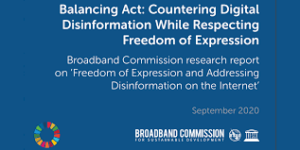 As a new analysis (right) suggests, it’s a delicate balancing act. State-based responses to disinformation entail significant risks associated with legal and regulatory approaches that violate international norms of freedom of expression. Without appropriate debate, transparency and scrutiny this can lead to undesirable consequences such as the effective criminalization of journalism, and other risks for human rights, in particular freedom of expression, press freedom, access to information, and privacy, says the report, Balancing Act: Countering Digital Disinformation While Respecting Freedom of Expression: Broadband Commission research report on ‘Freedom of Expression and Addressing Disinformation on the Internet’.
As a new analysis (right) suggests, it’s a delicate balancing act. State-based responses to disinformation entail significant risks associated with legal and regulatory approaches that violate international norms of freedom of expression. Without appropriate debate, transparency and scrutiny this can lead to undesirable consequences such as the effective criminalization of journalism, and other risks for human rights, in particular freedom of expression, press freedom, access to information, and privacy, says the report, Balancing Act: Countering Digital Disinformation While Respecting Freedom of Expression: Broadband Commission research report on ‘Freedom of Expression and Addressing Disinformation on the Internet’.
An alternative non-governmental approach, the report suggests, entails investing in fact-checking initiatives, public interest journalism and media literacy programs.
 As malign state actors threaten to undermine democratic ideals and institutions, how can democracies respond? The New Yorker’s Susan Glasser asked a CEPA panel comprising Carl Gershman (right), President of the National Endowment for Democracy; Fiona Hill, Senior Fellow, Foreign Policy, Center on the United States and Europe, Brookings Institution; H.E. Věra Jourová, Vice President for Values and Transparency, European Union Commission, and The Hon. Sheldon Whitehouse, (D-RI), U.S. Senator for Rhode Island.
As malign state actors threaten to undermine democratic ideals and institutions, how can democracies respond? The New Yorker’s Susan Glasser asked a CEPA panel comprising Carl Gershman (right), President of the National Endowment for Democracy; Fiona Hill, Senior Fellow, Foreign Policy, Center on the United States and Europe, Brookings Institution; H.E. Věra Jourová, Vice President for Values and Transparency, European Union Commission, and The Hon. Sheldon Whitehouse, (D-RI), U.S. Senator for Rhode Island.
While Russia is a declining power facing an existential threat in Belarus, China is on the rise and seeks to replace established norms with authoritarian alternatives, said Gershman, citing Nobel Laureate Liu Xiaobo’s observation that an emerging Chinese dictatorship would pose a threat to democratic values and institutions worldwide. Despite recent divergences, there is still considerable scope for transatlantic democracies to coordinate a pushback against Chinese and Russian aggression, observers suggest.

AJC
While “Europe’s increasingly strong public objections to China’s human rights policies are unlikely to go beyond words,” says a Brookings analysis, last week’s virtual EU-China summit highlighted continuing areas of friction between China and Europe, especially on market access and human rights, another commentator suggests. The first nine months of 2020 have seen a significant hardening of European positions on China, both from the EU as a whole and from individual member states as a result of China’s “mask diplomacy” and disinformation attempts amid the pandemic which alienated Europeans governments and the public alike. Consequently,…
-
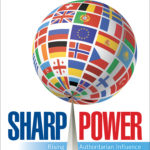
National Endowment for Democracy (NED)
The US and Europe could collaborate to counter China at the UN and other international organizations where Beijing aims to shape and bend these organizations to its values and interests (particularly by preventing criticism of China) by using such phrases as “community of a shared future for mankind” and “the democratization of international relations,” CSIS observes. China is attempting to introduce its “values” in the UN framework through using Western expressions which “deliberately degrade consensus around universal human rights.”
- Open a deep transatlantic discussion on the role of values and their embedment in new technologies, with a more stringent focus on how technological issues could affect human rights.
A recent Atlantic Council analysis of polices highlighted high degrees of transatlantic convergence and clear possibilities for powerful joint initiatives, focused on five broad areas of Chinese behavior:
- autocratic practices and human-rights violations;
- coercive diplomacy and influence operations;
- technology theft and cyber competition;
- predatory trade and investment practices; and
- aggressive behavior in the military and security areas.
On human rights – the highest level of convergence – democratic nations should restate the importance of core democratic values, individual human rights, freedom of information, rule of law, and privacy rights in the face of China’s alternative governance model, ACUS adds.
Does the Chinese model of techno-authoritarianism pose a threat outside its region? CEPA asked.
 The Chinese Communist Party’s strategic aims include becoming the next world power by 2049 and the global AI leader by 2030, notes a new analysis. In China, AI fuels techno-authoritarianism, said the U.S.-China Economic and Security Review Commission’s 2019 report.
The Chinese Communist Party’s strategic aims include becoming the next world power by 2049 and the global AI leader by 2030, notes a new analysis. In China, AI fuels techno-authoritarianism, said the U.S.-China Economic and Security Review Commission’s 2019 report.- The United States should be clear-eyed about the rise of techno-authoritarianism and push back hard with a new concert of democracies, said NED board member William J Burns (above) in a recent Carnegie analysis.
Similarly, with regard to Russia, the transatlantic democracies must address a series of urgent issues, from the poisoning of Alexei Navalny to the Nordstream pipeline and election interference, CEPA observed.
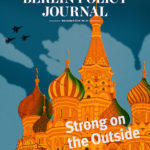 As a group of acting and former diplomats, military and intelligence officials, and experts recently observed, Nord Stream 2 is not too far advanced to be stopped, especially if the Transatlantic community would:
As a group of acting and former diplomats, military and intelligence officials, and experts recently observed, Nord Stream 2 is not too far advanced to be stopped, especially if the Transatlantic community would:
- Use all possible multinational legal and sanctions tools to ensure the Kremlin’s proposed Nord Stream 2 gas pipeline project will never be allowed to come into operation.
- Take joint steps to actively consider the reduction of the volume of crude oil that our nations import from Russian state-owned enterprises.
- Open a robust dialogue to forge new Transatlantic political norms aimed at blunting the ability of some former Western officials from becoming well-paid conduits of Russian malign influence policies following government service.
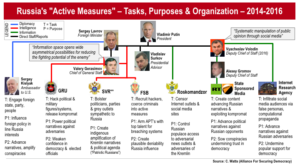
Clint Watts/Alliance for Securing Democracy
The Nord Stream 2 project is central to Putin’s two-pronged strategy towards Europe, the Atlantic Council observes. It aims to make Europeans more reliant on Russian natural gas, while also bypassing existing pipelines in Ukraine and Belarus, making these two former Soviet republics less strategically important, leaving them vulnerable to Russian pressure and paving the way for their possible future occupation.
In the aftermath of its aggression against Ukraine, all countries on the Europe’s eastern periphery have an adversarial relationship with Moscow, or at the very least consider it a threat, Carnegie analysts suggest. By violating the fundamental norms of the European security order, Russia has planted the seeds of instability, unpredictability, and a lasting sense of insecurity on both sides.
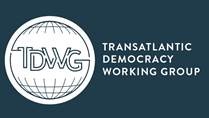 As a recent open letter from democracy advocates suggested, the priorities of the West—the United States, NATO and the EU—toward Russia should be…….
As a recent open letter from democracy advocates suggested, the priorities of the West—the United States, NATO and the EU—toward Russia should be…….
First, to maintain the defense and security of the Euro-Atlantic area, in close consultation and cooperation with allies. This commitment is the bedrock of the NATO alliance. It does not depend on Russia’s consent and is not diminished by the challenge China poses.
Second, to restore the political integrity of the Euro-Atlantic area, which has been damaged by the causes of “America First” and “European strategic autonomy.” The menu of common challenges Europe and America face regarding China creates a further potential for U.S. cooperation with Europe, whereas we regard cooperation with Russia over China as a diversion and a fantasy.
Third, to uphold the post-Cold War settlement and constrain those who would reverse it. Our cause in NATO partner and Eastern Partnership countries is not to export liberal democracy. It is to defend sovereignty and freedom of choice, and also provide meaningful but conditional support to those pursuing the goals of European and Euro-Atlantic integration. ….
Fourth, to undertake a concerted effort to engage Russia in a restoration of the much-eroded arms control regime. That will not be accomplished by adhering to agreements that have outlived their utility. To be effective, arms control must keep pace with military-technical reality and, of course, be verifiable.
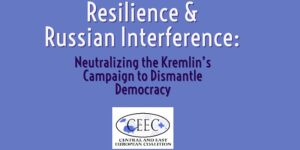 Fifth, to strengthen the resilience and defense-mindedness of liberal democracies subjected to malign Russian activity in Western politics and business. Such activity would be significantly less toxic if Western political and business circles were not so complicit in it. The United States and the EU need to invest in joint platforms to address Russia’s alliance with corrupt entities in our own countries and develop joint mechanisms to combat it.
Fifth, to strengthen the resilience and defense-mindedness of liberal democracies subjected to malign Russian activity in Western politics and business. Such activity would be significantly less toxic if Western political and business circles were not so complicit in it. The United States and the EU need to invest in joint platforms to address Russia’s alliance with corrupt entities in our own countries and develop joint mechanisms to combat it.
Sixth, to engage in vigorous, well-substantiated dialogue with Russia—and the full spectrum of Russians. Let there be no doubt that it is Russia’s authorities who have limited the scope of dialogue.
 Democracies must defend their basic principles and not succumb to autocratic methods against authoritarian foes.
Democracies must defend their basic principles and not succumb to autocratic methods against authoritarian foes.
However, openness can serve as a double-edge sword, CSIS adds. Russia and China have exploited democratic free speech requirements to pursue their influence activities. One such instance occurred when a UK regulator imposed restrictions on Russia Today (RT), with RT then suing to protect its “free speech.” Similarly, an overly regulated media space, such as strict libel laws in the United Kingdom, can give foreign influence actors legal ground to sue those calling attention to malign influence activities.







